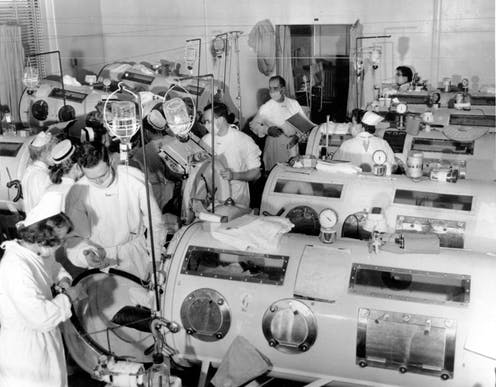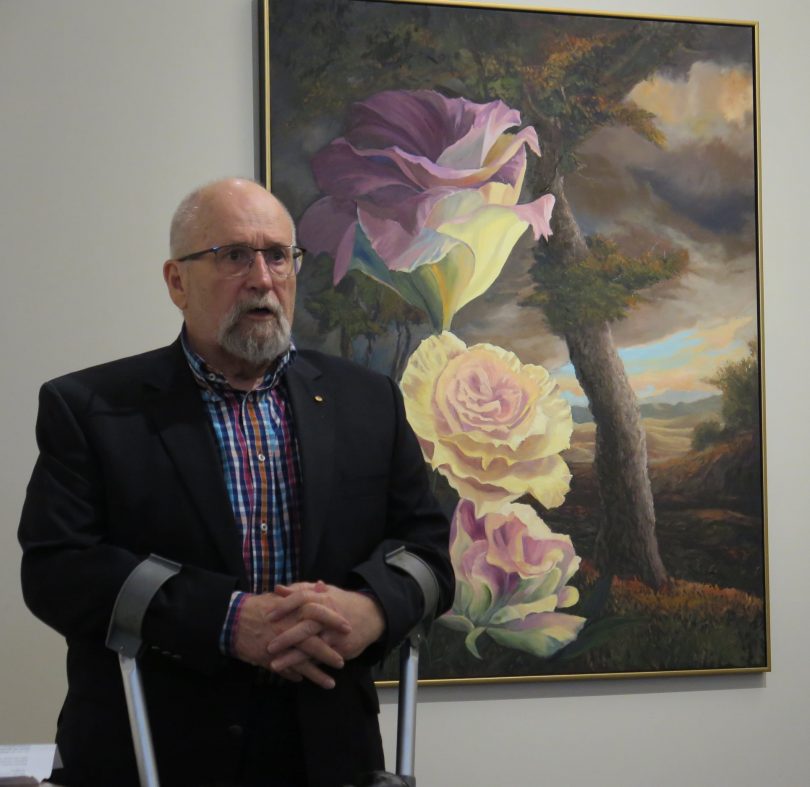
Polio patients in iron lungs during past epidemics. Photo: wiki commons
When we discuss global pandemic history, it’s most often the Spanish Influenza. But victims of a much more recent pandemic say COVID-19 raises deeply rooted concerns about who receives treatment and on what basis.
For decades, poliomyelitis rolled around the world in repeating epidemic waves, bringing with it absolute terror for parents who feared their children would be struck down.
Like COVID-19, polio was a terrible lottery. It could mean death or lifelong paralysis, with the hovering threat of calipers, crutches, prosthetic boots or the iron lung, a huge tank-like respirator.
And until the arrival of the Salk vaccine, there was no cure for the disease. It’s estimated that at least 20,000 to 40,000 people had paralytic polio in Australia and that up to four million Australians could have been infected.
One of them was Roger Beale. With a distinguished APS career behind him as Secretary of the Department of the Environment, Sport and Territories and later Department of the Environment and Heritage, he also chaired a review of Australia’s Quarantine and Biosecurity Arrangements, was a Commissioner of the Climate Commission and now sits on the Australian Centre for Christianity and Culture’s board of directors.

Roger Beale AO is also a noted Canberra artist. Photo: Facebook.
In 1948, he was a polio-afflicted two-year-old whose parents were desperate to ensure he had the best chance at life.
They were living in South Africa where the growing tide of apartheid was already prompting unease. But the promise of radical post-polio therapy in Australia was a key decider for the family’s move here.
Roger’s mother had heard about Sister Elizabeth Kenny, an Australian nurse whose approach to polio patients was the diametric opposite of prevailing wisdom.
“Instead of constraining patients, she advocated very active remediation as soon as the crisis had passed,” Roger says. “It took place outdoors if possible, involving hydrotherapy, exercise and stretching programs. It could be painful but there was a profound difference from the immobilisation and institutionalisation of conventional polio treatment.”
Equally significant was the message that these patients’ lives had value.
Roger’s parents rejected any notion of separate schooling and different treatment.
“Everything was to be mainstream and I made my own way in the world, for which I am eternally grateful, but that was not the conventional approach,” he says. “My parents had to fight for it all the way.”
Other patients were not so fortunate. They were hospitalised or institutionalised for long periods, treated as different from other people and regarded with fear because the disease vector was so poorly understood.
“I had a huge fear of institutionalised disregard,” Roger says. “It haunted the rest of my childhood, that sense of worry about abandonment, that you were in infectious-care hospitals where you were very much alone. As a young child that is a devastating feeling.”
It also underpins one of his major concerns about COVID-19: that if we are gripped by a major health crisis where resources are under intense pressure, generations of polio survivors and others who are disabled may be arbitrarily excluded from intensive care or ventilator support.
“That great fear of dying alone, that our lives are of no value, is a searing issue,” he says.
His deep personal concern is that treatment and resource allocation should be underpinned by a clear ethical framework.
If hospitals are overwhelmed by COVID-19, should discrimination on the grounds of age or disability be prevented in the same way that ethnicity, race, gender, religion, social status and wealth are already precluded?
And how should that weigh up against utilitarian principles that prioritise the greatest good for the greatest number of people?
Roger’s point is that these will always be anguished, dreadful decisions with far-reaching consequences. But they must be made within clear and established ethical guidelines rather than on an ad hoc basis in the middle of an emergency.
“For me personally, a fundamental part of my Christian faith is that Christ was there for all in a non-discriminatory way, and particularly for people with broken lives,” he says.
“Governments are very understandably anxious about whether they are seen to be playing God, but we make ethical decisions all the time that means some will live and some will die.
“When I ran transport, we knew that if you reduced speed limits by 10 km/h proportionately you’d save hundreds of lives. But we don’t do it because it would be inconvenient. Yet we spend a lot more time and money saving people from being eaten by sharks than in almost any other way, for example.”
So how would you decide who gets the ventilator?
Original Article published by Genevieve Jacobs on The RiotACT.







